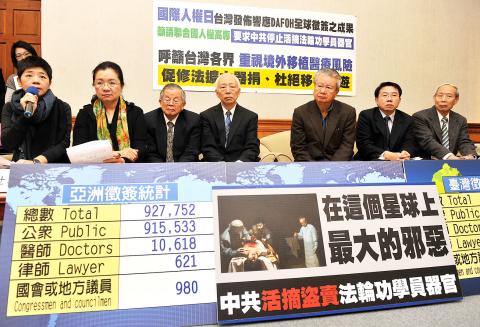A petition initiated by Doctors Against Forced Organ Harvesting to stop the practice in China has garnered more than 230,000 signatures in Taiwan, lawmakers and activists said on Human Rights Day yesterday.
The appeal to the UN Human Rights High Commissioner was started in the middle of June and calls for an “immediate end of forced organ harvesting from Falun Gong practitioners in China.”
As of the end of last month, nearly 1.5 million people around the world have signed the petition, including about 1 million from Asia.

Photo: Chien Jung-fong, Taipei Times
Democratic Progressive Party (DPP) Legislator You Mei-nu (尤美女) said that Taiwan is a nation governed by human rights principles and Taiwanese, who are guaranteed the right to health, should not “build their wellbeing on somebody else’s sorrow or pain.”
“China has been the main destination of Taiwanese needing organ transplants. However, we have to be aware that a lot of the organs used for transplants in China are sourced from prisoners of conscience and imprisoned Falun Gong practitioners... The public has the right to know and the transparency of relevant information should be enforced by our government,” she said.
DPP Legislator Tien Chiu-chin (田秋堇) said Taiwanese are blessed today because they enjoy the product of their predecessors’ struggle for freedom from fear and for free speech.
“They are like the air. People don’t sense their presence until they are taken away, ” she said.
“I’ve personally seen a Falun Gong practitioner calling a hospital in China and getting the response that a patient in need can undertake the matching process needed for an organ transplantation any time,” she added. “It makes people suspect that there exists an organization that operates like an organ supermarket.”
International Care Association of Organ Transplants chairman Hu Nai-wen (胡乃文) said the Chinese government has failed to explain the discrepancy between the number of organ transplants performed in China and the number of executed prisoners, which it identified as the source of the organs.
Tien said she had proposed, unsuccessfully, to deny National Health Insurance coverage for anti-rejection medications to those who did not fill out a form stating the name of the hospital and the surgeon who performed the organ transplant.
“People are asked to fill out the form for the coverage, but there is no punishment if you fail to comply,” Tien said.
Responding to the lawmakers’ and groups’ concerns, Ministry of Health and Welfare’s Department of Medical Affairs Director Lee Wei-chiang (李偉強) said the government does not encourage overseas organ transplantations due to the medical risk and questions about the source of the organs.
“The number of Taiwanese who went to China for organ transplants has been decreasing over the years. And there is a consensus that organs donated by prisoners should not be accepted,” Lee said.
He added that the ministry has proposed an amendment to the Human Organ Transplant Act (人體器官移植條例), which would make brokering organ transplants a crime subject to one to five years in prison.

SHIPS, TRAINS AND AUTOMOBILES: The ministry has announced changes to varied transportation industries taking effect soon, with a number of effects for passengers Beginning next month, the post office is canceling signature upon delivery and written inquiry services for international registered small packets in accordance with the new policy of the Universal Postal Union, the Ministry of Transportation and Communications said yesterday. The new policy does not apply to packets that are to be delivered to China, the ministry said. Senders of international registered small packets would receive a NT$10 rebate on postage if the packets are sent from Jan. 1 to March 31, it added. The ministry said that three other policies are also scheduled to take effect next month. International cruise ship operators

NUMBERS IMBALANCE: More than 4 million Taiwanese have visited China this year, while only about half a million Chinese have visited here Beijing has yet to respond to Taiwan’s requests for negotiation over matters related to the recovery of cross-strait tourism, the Tourism Administration said yesterday. Taiwan’s tourism authority issued the statement after Chinese-language daily the China Times reported yesterday that the government’s policy of banning group tours to China does not stop Taiwanese from visiting the country. As of October, more than 4.2 million had traveled to China this year, exceeding last year. Beijing estimated the number of Taiwanese tourists in China could reach 4.5 million this year. By contrast, only 500,000 Chinese tourists are expected in Taiwan, the report said. The report

The Forestry and Nature Conservation Agency yesterday launched a gift box to market honey “certified by a Formosan black bear” in appreciation of a beekeeper’s amicable interaction with a honey-thieving bear. Beekeeper Chih Ming-chen (池明鎮) in January inspected his bee farm in Hualien County’s Jhuosi Township (卓溪) and found that more than 20 beehives had been destroyed and many hives were eaten, with bear droppings and paw prints near the destroyed hives, the agency said. Chih returned to the farm to move the remaining beehives away that evening when he encountered a Formosan black bear only 20m away, the agency said. The bear

HORROR STORIES: One victim recounted not realizing they had been stabbed and seeing people bleeding, while another recalled breaking down in tears after fleeing A man on Friday died after he tried to fight the knife-wielding suspect who went on a stabbing spree near two of Taipei’s busiest metro stations, Taipei Mayor Chiang Wan-an (蔣萬安) said. The 57-year-old man, identified by his family name, Yu (余), encountered the suspect at Exit M7 of Taipei Main Station and immediately tried to stop him, but was fatally wounded and later died, Chiang said, calling the incident “heartbreaking.” Yu’s family would receive at least NT$5 million (US$158,584) in compensation through the Taipei Rapid Transit Corp’s (TRTC) insurance coverage, he said after convening an emergency security response meeting yesterday morning. National